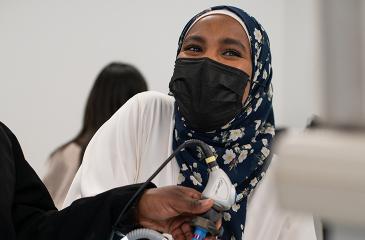In Fall 2021, the Pre-Health Student Resource Center (PHSRC) launched the Health Profession Pathways program, which supports students from diverse backgrounds as they develop into future leaders in health professional careers. Students in the Pathways program have unique opportunities for networking, volunteering, and shadowing. They also receive regular coaching from PHSRC staff on a variety of topics, including academic progress, navigating University resources, and building pre-health related experiences.
The program currently has 18 students participating, all first-year undergraduate students with an interest in health careers and who come from communities historically underrepresented. Pathways students recently completed AHS 1104: Experiences in Health, a spring 2022 course exclusively for Pathways students. In the course, they had experiential opportunities across many health science programs, including pharmacy, nursing, dentistry, medical laboratory sciences, occupational therapy, physical therapy, veterinary medicine, and public health. Faculty from the Center for Interprofessional Health led guest lectures on interprofessional competencies including teamwork and communication. For the final hands-on class period, students visited the M Simulation Center in April for their capstone experience working with standardized patients and performing technical simulations.
“From the work of the Health Profession Pathways Initiative Taskforce, we learned that one barrier our students face is they don't often have access to career knowledge or have family members who are health care providers or even attended college,” said Fatima Omar, Pathways program manager. “In the AHS 1104 course and through the partnerships with our health sciences schools and centers, our Pathways students receive a unique opportunity to go into our health science schools and learning spaces each week and interact with various health professionals and students. Our students get to picture themselves as health professional students at the University of Minnesota in the near future, and that has been the most rewarding part.”
For the capstone experience, M Simulation staff first provided a broad overview of simulation, and how it applies to health care education and clinical skills training. Several stations were set up for students to practice technical simulation skills using laparoscopic surgery task trainers, followed by human simulation group role play with the standardized patients, and then a Q&A panel with health care providers.
“My favorite part was interacting with the standardized patients,” said Hamza Habib, a Pathways student. “It was fun to act as though I was a physician and try to help the patient. It gave me a good understanding of the demands of health care providers and problem-solving. In the Pathways program, I learned about different health professions and gained a better understanding of what they do and how they work as a team. Being a part of the Pathways program means belonging to a small community. I have the support of great faculty and staff who help us students reach our goals. The opportunities are endless.”
Jocelyn Machtemes, another Pathways student added, “Interacting with standardized patients really gave an authentic feel into what we will be doing someday. I plan on going into surgery, so the laparoscopic surgery simulation was extremely fun for me. I really enjoyed touring M Simulation and seeing the different simulation rooms they had set up. Being a part of the Pathways program made the transition from a small school to a large University more comfortable, as did being surrounded by people with similar goals and diverse backgrounds. We all got to know each other, and by the end of the year, I felt much closer to my fellow Pathways Students and the University as a whole."
The Pre-Health Student Resource Center coaches students through the stages of explore, prepare, apply: exploring a variety of health career options and engaging in self-reflection to find the best fit, preparing a well-rounded and authentic portfolio of experiences, and applying to health professional degree programs. In 2018, the Pre-Health Student Resource Center launched the Health Profession Pathways Initiative (HPPI), and convened a system-wide HPPI Taskforce. An overarching goal of the HPPI and its taskforce is to build a more diverse health professional workforce in Minnesota by increasing enrollment in health professional programs for well-prepared students from historically underrepresented communities.



